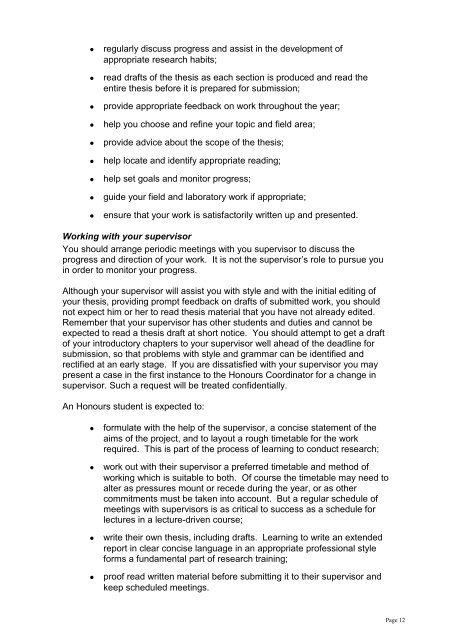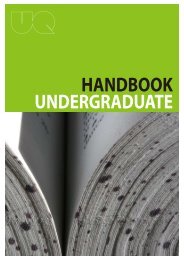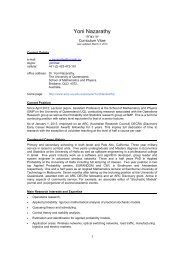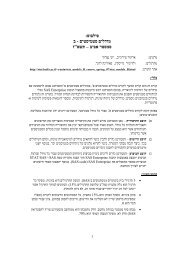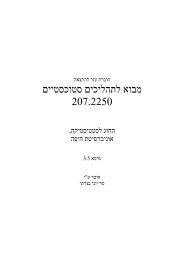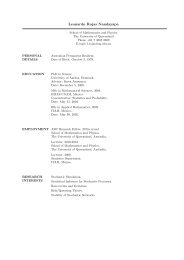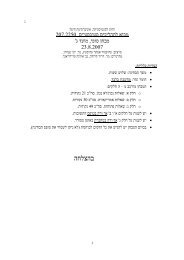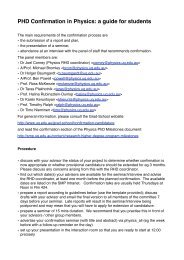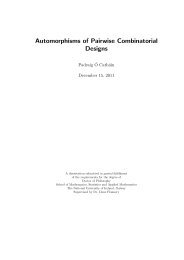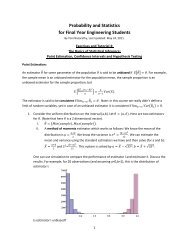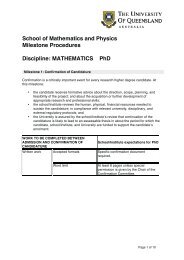2012 Handbook Honours - School of Mathematics and Physics ...
2012 Handbook Honours - School of Mathematics and Physics ...
2012 Handbook Honours - School of Mathematics and Physics ...
You also want an ePaper? Increase the reach of your titles
YUMPU automatically turns print PDFs into web optimized ePapers that Google loves.
• regularly discuss progress <strong>and</strong> assist in the development <strong>of</strong><br />
appropriate research habits;<br />
• read drafts <strong>of</strong> the thesis as each section is produced <strong>and</strong> read the<br />
entire thesis before it is prepared for submission;<br />
• provide appropriate feedback on work throughout the year;<br />
• help you choose <strong>and</strong> refine your topic <strong>and</strong> field area;<br />
• provide advice about the scope <strong>of</strong> the thesis;<br />
• help locate <strong>and</strong> identify appropriate reading;<br />
• help set goals <strong>and</strong> monitor progress;<br />
• guide your field <strong>and</strong> laboratory work if appropriate;<br />
• ensure that your work is satisfactorily written up <strong>and</strong> presented.<br />
Working with your supervisor<br />
You should arrange periodic meetings with you supervisor to discuss the<br />
progress <strong>and</strong> direction <strong>of</strong> your work. It is not the supervisor’s role to pursue you<br />
in order to monitor your progress.<br />
Although your supervisor will assist you with style <strong>and</strong> with the initial editing <strong>of</strong><br />
your thesis, providing prompt feedback on drafts <strong>of</strong> submitted work, you should<br />
not expect him or her to read thesis material that you have not already edited.<br />
Remember that your supervisor has other students <strong>and</strong> duties <strong>and</strong> cannot be<br />
expected to read a thesis draft at short notice. You should attempt to get a draft<br />
<strong>of</strong> your introductory chapters to your supervisor well ahead <strong>of</strong> the deadline for<br />
submission, so that problems with style <strong>and</strong> grammar can be identified <strong>and</strong><br />
rectified at an early stage. If you are dissatisfied with your supervisor you may<br />
present a case in the first instance to the <strong>Honours</strong> Coordinator for a change in<br />
supervisor. Such a request will be treated confidentially.<br />
An <strong>Honours</strong> student is expected to:<br />
• formulate with the help <strong>of</strong> the supervisor, a concise statement <strong>of</strong> the<br />
aims <strong>of</strong> the project, <strong>and</strong> to layout a rough timetable for the work<br />
required. This is part <strong>of</strong> the process <strong>of</strong> learning to conduct research;<br />
• work out with their supervisor a preferred timetable <strong>and</strong> method <strong>of</strong><br />
working which is suitable to both. Of course the timetable may need to<br />
alter as pressures mount or recede during the year, or as other<br />
commitments must be taken into account. But a regular schedule <strong>of</strong><br />
meetings with supervisors is as critical to success as a schedule for<br />
lectures in a lecture-driven course;<br />
• write their own thesis, including drafts. Learning to write an extended<br />
report in clear concise language in an appropriate pr<strong>of</strong>essional style<br />
forms a fundamental part <strong>of</strong> research training;<br />
• pro<strong>of</strong> read written material before submitting it to their supervisor <strong>and</strong><br />
keep scheduled meetings.<br />
Page 12


